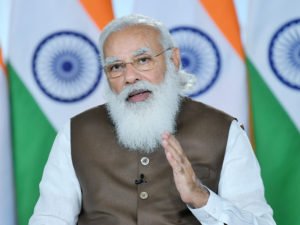

Speed Post News Network
New Delhi : Prime Minister Narendra Modi on March 5, 2021, addressed a webinar on Production Linked Incentives scheme organised by Department of Industry and International Trade and NITI Aayog here through video conference.
Speaking on the steps taken to boost trade and industry in this year’s Union Budget, the Prime Minister said that over the past 6-7 years several successful efforts have been made to encourage Make in India at different levels. He stressed on the need to take a big leap, increase the speed and scale to boost manufacturing. He cited examples around the world where countries have accelerated the development of the country by increasing their manufacturing capacities. He said increasing manufacturing capacities would increase employment generation in the country proportionally, according to a PIB release.
The Prime Minister said the Government’s thinking is clear – Minimum Government, Maximum Governance and expects Zero Effect, Zero Defect. He said the Government is working at every level to promote the industry like Ease of Doing Business, reducing the compliance burden, creating multimodal infrastructure to reduce logistics costs, constructing district level export hubs.
He said the government believes that government interference in everything creates more problems rather than solutions. Therefore, Self-Regulation, Self-Attesting, Self-Certification are being emphasised. He emphasised the need to make Indian companies and manufacturing in India, globally competitive and also, to create global recognition for our production cost, products, quality and efficiency. “We have to attract cutting edge technology and maximum investment in the sectors related to our core competency,” he said .
Underlining the difference between the earlier schemes and the schemes of the current government, the Prime Minister said, earlier, industrial Incentives used to be open ended input based subsidies, now they have been made targeted and performance based through a competitive process. The Prime Minister said 13 sectors have been brought under Production Linked Incentives for the first time. PLI benefits the entire ecosystem associated with the sector. With PLI in auto and pharma, there will be very less foreign dependence related to auto parts, medical equipment and raw materials of medicine. He added that the energy sector will be modernised in the country with the help of Advanced Cell Batteries, Solar PV modules and Specialty Steel. Similarly, the PLI for the textile and food processing sector will benefit the entire agriculture sector.
The Prime Minister remarked that it is a matter of pride that following India’s proposal, the United Nations has declared the year 2023 as the International Year of Millets. He said more than 70 countries came to support India’s proposal and unanimously accepted it in the UN General Assembly. He said this is also a big opportunity for our farmers. He urged to start a worldwide campaign in 2023 on the nutritional potential of millets or coarse grains to protect people from getting sick. He said that the demand for millets at home and abroad will increase rapidly with the announcement of the International Year of Millets by the UN in 2023 and this will greatly benefit our farmers.
The Prime Minister highlighted that in this year’s budget, a provision of about Rs 2 lakh crore has been made for schemes related to the PLI scheme. An average of 5 % of production is given as incentive. This means that PLI schemes will lead to production worth $ 520 billion in India in the next five years. It is also estimated that sectors for which the PLI scheme has been created will witness doubling of the workforce. In the Pharma sector, the Prime Minister expects more than Rs 15,000 crore investment in next 5-6 years under PLI.
The Prime Minister asserted that the way India is serving humanity today, India has become a big brand all over the world. India’s credibility and its identity is constantly reaching new heights. He said the brand of India is continuously reaching new heights. He said trust has increased in our medicine, our medical professionals and our Medical Equipments across the world. To honor this trust, he urged the pharma sector to work on chalking out long-term strategy to take advantage of this.